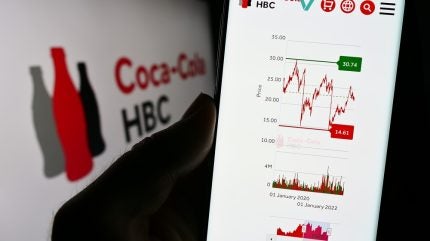
Coca-Cola HBC has agreed to acquire a 75% shareholding in Coca-Cola Beverages Africa (CCBA) for US$2.6bn, valuing the African bottler at US$3.4bn.
The transaction would create the world’s second-largest Coca-Cola bottling partner by volume and materially expand Coca-Cola HBC’s footprint across high-growth African beverage markets.

Discover B2B Marketing That Performs
Combine business intelligence and editorial excellence to reach engaged professionals across 36 leading media platforms.
The company targets completion by the end of 2026, subject to approvals. As part of the Coca-Cola HBC acquisition, Gutsche Family Investments (GFI) will receive new Coca-Cola HBC shares equal to 5.47% of the enlarged share capital, and a bridge facility will fund the cash element.
An option agreement gives Coca-Cola HBC the right to buy, or The Coca-Cola Company (TCCC) the right to sell, the remaining 25% of CCBA after completion.
Scale and market reach across Africa and Europe
CCBA operates in 14 African markets and accounts for about 40% of Coca-Cola system volumes on the continent.
Following completion, Coca-Cola HBC estimates it would represent roughly two-thirds of Africa’s Coca-Cola system volume and cover more than half of the continent’s population.

US Tariffs are shifting - will you react or anticipate?
Don’t let policy changes catch you off guard. Stay proactive with real-time data and expert analysis.
By GlobalDataOn a pro forma basis for 2024, the combined group would have produced 4.0bn unit cases, with revenues of €14.1bn and EBIT of €1.4bn.
The enlarged bottler would have leading positions across Africa and Europe, reinforcing its stated ambition to be a “24/7 beverage partner” in non-alcoholic ready-to-drink (NARTD) categories.
Strategic rationale and growth outlook
Management highlights demographic and macroeconomic drivers behind the CCBA deal, including fast-growing populations and a large under-30 consumer base in CCBA’s territories.
Coca-Cola HBC expects the combination to increase diversification, deepen exposure to emerging markets and support per-capita consumption growth.
The company plans to apply its operating model, route-to-market capabilities and sustainability initiatives alongside CCBA’s existing portfolio of more than 40 global and local brands.
The acquisition is positioned as a natural extension of Coca-Cola HBC’s long-standing presence in Nigeria and its 2022 entry into Egypt, creating a broader platform to share best practices across African markets.
Financial impact, funding and shareholder measures
Coca-Cola HBC guides to low single-digit earnings per share accretion in the first full year after completion.
Leverage is expected toward the upper end of the medium-term target range of 1.5x–2.0x net debt to EBITDA, with no anticipated effect on the company’s investment-grade credit profile.
To prioritise the transaction, the existing share buyback programme has been cancelled with immediate effect.
Funding will include a new bridge financing facility, alongside the share consideration issued to GFI. The option agreement with TCCC provides a pathway to full ownership of CCBA over time, subject to future decisions and regulatory clearances.
Listing plans and regulatory timeline
To reflect its enlarged African presence and “Coca-Cola Beverages Africa” brand relevance, Coca-Cola HBC intends to pursue a secondary listing on the Johannesburg Stock Exchange, signalling a long-term commitment to South Africa and the wider region.
The company targets closing by the end of 2026, pending regulatory and competition approvals in the relevant jurisdictions and customary closing conditions.
Until completion, both companies will operate independently.





